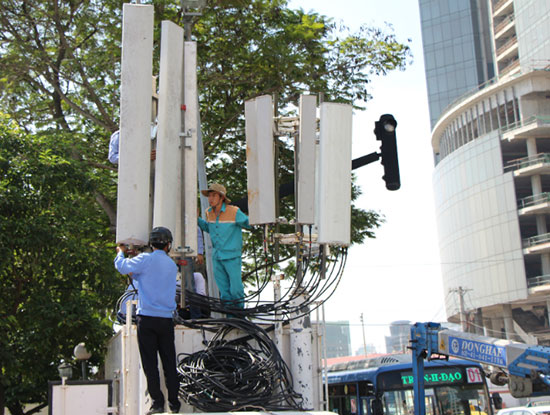Mobile subscribers communicate via Facebook instead of voice, SMS
Deputy CEO of Viettel, the military telco, one of the three largest mobile network operators, said in previous years, telcos had to prepare in advanc to prevent network congestion during Tet because of the high capacity of voice calls and SMS at certain moments.
However, it was no longer a problem last Tet. Mobile subscribers tend to send New Year greetings to their friends and relatives via Facebook instead of making voice calls or sending SMS.
Viettel noted that in the rush hours – the 2017 Lunar New Year Eve and the first day of the Year of a Rooster, the voice call capacity increased only by 10 percent, while the data capacity increased by 15 percent.
 |
Meanwhile, in the years before, the voice call and SMS capacity soared sharply during these moments because subscribers sent greetings to friends at the same time.
Viettel noted that large numbers of subscribers moved to Nam Dinh, Thai Binh, Thanh Hoa, Nghe An and Phu Tho during Tet, but the concentration did not cause congestion and the network still could operate perfectly with no interruptions.
In fact, mobile network operators prepared well before Tet to prevent congestion. Viettel, for example, launched 4G in order to ease the load on 3G. “There was no case of network congestion reported,” Thang said.
Explaining the modest increase in SMS and data capacity compared with previous years, Thang cited two major reasons.
First, there was no firework festival last Tet, but the number of people gathering in the same places and at the same time were not high and the capacity did not increase too sharply. Second, Thang noted big changes in subscribers’ taste. In the past, subscribers liked making calls or SMS. They prefer sending greetings on Facebook. The load on networks has changed in accordance with consumer behavior.
“We had to use mobile wi-fi stations in previous years in order to share load with 3G and 2G networks. But we have 4G this year which allows us to ease the overload on 3G,” Thang said, adding that Viettel used about 11,000 4G stations to support 3G network amid the sharp increase in data service demand in the 2017 Tet.
A representative of the Vietnam Post and Telecommunication Group (VNPT) also confirmed that the congestion did not occur in the 2017 Tet. No congestion case was reported from Thai Binh and Nghe An, despite large numbers of subscribers there during Tet.

